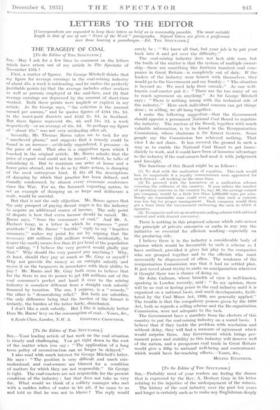LETTERS TO THE EDITOR
[Correspondents are requested to keep their letters as brief as is reasonably possible. The most suitable length is that of one of our " News of the Week " paragraphs. Signed letters are given a preference over those bearing a pseudonym.—Ed. THE SPECTATOR:]. '
THE TRAGEDY OF COAL [To the Editor of THE SPECTATOR.] Siti,—May I ask for a few lines to comment on the letters Which have arisen out of my article in The Spectator of Xovember 15th ?
First, a matter of figures. Sir George Mitchell thinks that My figure for average earnings in the coal-mining industry Of about 45s. a week is misleading, and he makes the perfectly justifiable points (a) that the average includes other workers as well as persons employed at the coal-face, and (b) that average earnings arc depressed by the amount of short-time worked. Both these points were implicit or explicit in my article. As Sir George says, " the criterion is the amount earned per annum," and he quotes figures of £104 1.9s. 2d. in the worst-paid districts and £138 2s. 8d. in Scotland. (hit these figures represent 40s. 4d. and 51s. 2d. a week respectively—or an average of 45s. 9d. So perhaps my figure cif " about 45s." was not very misleading after all.
Secondly, Mr. Thomas Burns takes me to task for my " unrelieved glooin," and suggests that a remedy could be fiaind in an increase—artificially engendered, I presume--in t he price of coal. That also is a suggestion upon which I touched in the original article. Mr. Burns admits that the price of export coal could not be raised ; indeed, he talks of subsidising it. But to maintain one price at home and a lower price abroad, and to do so by State action, is dumping of the most outrageous kind. It fits all the descriptions of duMping by which that practice has been defined, and roundly condemned, by almdst every economic conference since the War. For us, the foremost exporting nation, to Set an example of dumping on So large and deliberate a scale, Would be suicidal.
But that is not the only objection. Mr. Burns agrees that I he only prospect of paying decent wages is for the inthistry to acquire an additional source of income. The • only point nf dispute is how that extra income should be raised. Mr. Burns says, " from the consumers of coal." And Mr. A. Herbert Gray, in a letter in which lie expresses " great gratitude " for Mr. Burns"' forcible reply to my " hopeless Sianmary," makes my point for me by arguing that the necessary £30 Millions (£20 Millions would, incidentally, be nearer the mark) means less than £1 per head of the population and adding,' " I believe the very poorest would gladly pay that." • Why should the very poorest pay anything ? Why, lit least, should they pay aS much as Mr. Gray or myself ? Why not provide the money as an Outright subsidy and assess it on the taxpayers in accordance with their ability to Pay ? Mr.'Burns and Mr. Gray both seem to believe that for the State to use its power to get £80 Millions out of the coal consumer's pocket and hand it over to the mining industry is somehow different from a straight cash subsidy financed by taxation. The one, I suppose, is a " remedy," the other is " demoralising relief." But both are subsidies, • the only difference being that the burden of the former is unfairly, the burden of the latter fairly, distributed. I don't like a cash subsidy. But I like it infinitely better than Mr, Burns' levy on the consumption of coal.—Yours, &c., 6 Keats Close, London, N.W . 8. GEonatEy CROWTHE R.












































 Previous page
Previous page